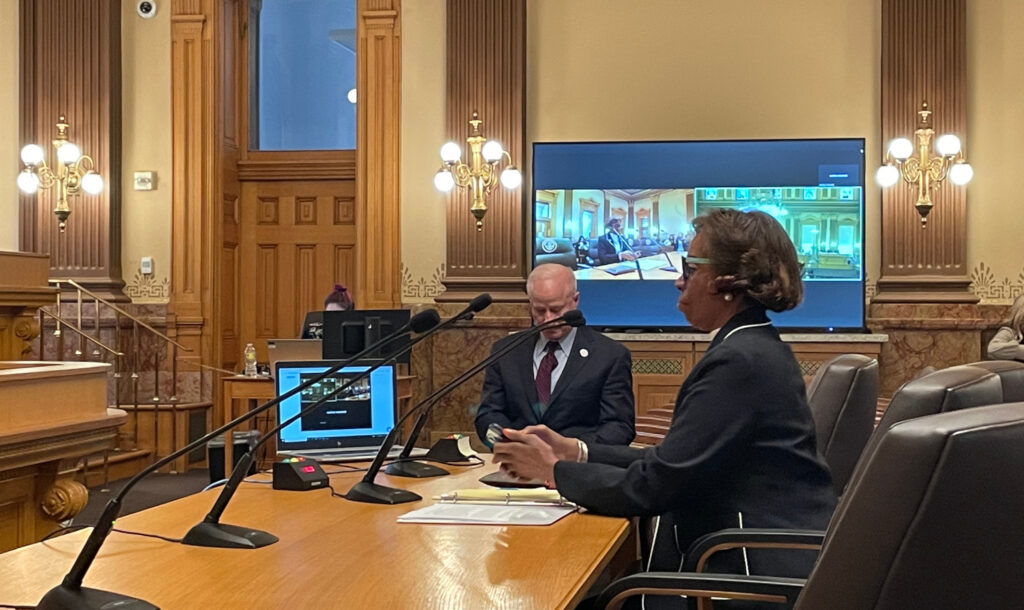Update: Gov. Jared Polis signed SB 23-075 into law on Tuesday, May 23.
By Jeffrey A. Roberts
CFOIC Executive Director
Legislation requiring the deletion of all juvenile victim and witness names from police and court records before the records are released to the public won unanimous approval in the Senate Judiciary Committee on Monday evening.
Lawmakers added an amendment that permits a news organization or anyone else to argue in court for the disclosure of the name of a child victim or witness — but only if they can show “that the public interest in accessing the name and identifying information … substantially outweighs the harm to the privacy interest of the child victim, child witness” or their legal guardians.

“I think what we’re establishing here in this amendment is a very high burden that the petitioner will have to meet, and I imagine in most cases it will not be met, which is the intent of the overall bill,” said Sen. Dylan Roberts, D-Eagle.
The Colorado Freedom of Information Coalition testified against the introduced version of Senate Bill 23-075, arguing that a mandatory blanket deletion of all minors’ names from criminal records “will make it harder to monitor cases that require scrutiny and accountability.”
“We recognize the need to protect children and their families,” CFOIC’s executive director told the committee, but the Colorado Criminal Justice Records Act already requires the deletion of identifying information of children who are victims of sex crimes and CCJRA gives records custodians the discretion to redact the names of other juvenile crime victims and witnesses upon a finding that disclosure would be “contrary to the public interest.”
‘Sometimes disclosure is in the public interest and there needs to be a way for agencies to consider that — on a case-by-case basis — and for records requesters to make that argument,” CFOIC said. We questioned whether, under SB 23-075, journalists will be able to corroborate the accounts of families and witnesses if they are barred from obtaining official records about a juvenile who is killed or injured in suspicious of controversial circumstances that require scrutiny.
In emotional testimony, witnesses discussed two cases in which the names of minor victims or witnesses could have been redacted by authorities under CCJRA as currently written but were not — for reasons that weren’t explained. One was the June 11, 2022, murder of 17-year-old Riley Whitelaw at the Colorado Springs Walgreens where she worked. The other was a Nov. 19, 2021, shooting in the parking lot of Hinkley High School in Aurora.
It was the Hinkley incident that spurred Sen. Rhonda Fields, D-Aurora, to introduce the bill. The names and identifying information of teenage witnesses were included in arrest affidavits released to the public, and the Aurora Sentinel linked to the affidavits in an online story. The newspaper, which did not include the witness information in its written story, later removed the links after Aurora Mayor Mike Coffman and a Hinkley employee expressed concerns a year later.
Fields said her bill “provides some safeguards to make sure that a child in Colorado, their information will not be exposed so the press can write a story. That’s what brought me here from the city of Aurora. That information was exposed, kids dropped out of school, their families were harassed. It caused a chilling effect in that school. No one wanted to cooperate with the police.”
“I can’t tell you how many other cases that we don’t even know about where (children’s and families’) lives have been interrupted because the press has been so interested in getting a story,” Fields told the committee. “You heard the press come up here and talk about, you know, whatever, that they wouldn’t do this. But we have evidence, we know that that’s their job … They want to get the story at the expense of exposing a child’s information.”
Two friends of Riley Whitelaw testified in favor of SB 23-075 as did her mother Courtenay Whitelaw, who said an unredacted arrest affidavit with her daughter’s name was posted on news websites within 24 hours of a warrant being obtained.
“My family and I had no time to grieve in private and I quickly realized that Riley’s friends might find out in horrific ways on the internet as news reports were shared,” she said. “Riley and I talked often about the pros and cons of social media, and she preferred to stay out the limelight. Yet here we are after her death, overexposed in headline news, not for the good human she is but for the crime against her.”
Riley’s friends, Whitelaw added, “didn’t deserve to find out such horrors from news or social media without any consideration of their mental health, trauma, fear, anguish and any other range of serious impact. They deserved to be told difficult information by a parent or another trusted adult with supports in mind or in place to cope.”
Another amendment approved by the judiciary committee makes the bill apply to any criminal justice record released on or after Jan. 1, 2024. Because SB 23-075 is expected to increase state judicial department expenditures $634,105 in fiscal year 2024-25, the bill will next be considered by the Senate Appropriations Committee.
Follow the Colorado Freedom of Information Coalition on Twitter @CoFOIC. Like CFOIC’s Facebook page. Do you appreciate the information and resources provided by CFOIC? Please consider making a tax-deductible donation.




